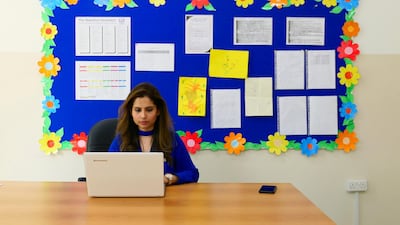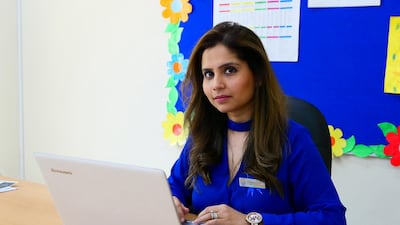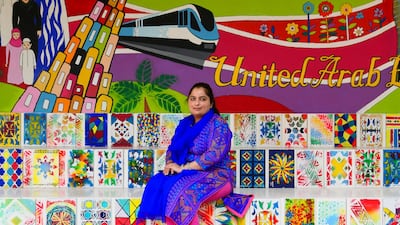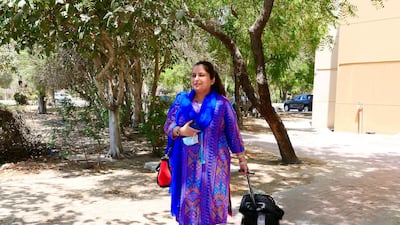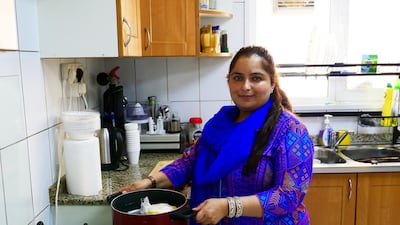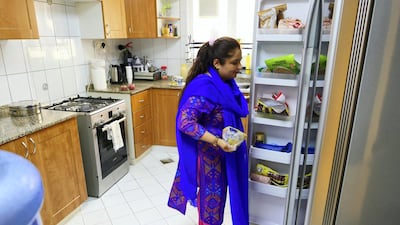Teachers in the UAE said they were happy and excited to be fasting in Ramadan, even as they spend long hours assisting pupils online and in class.
For teachers who are parents, the job does not end with the ringing of the school bell – they spend another few hours ensuring their children are not falling behind.
Private schools in Abu Dhabi and Dubai cut their school day to five hours from the usual seven during Ramadan.
But for many teachers, the day starts as early as 3.30am, when they wake up to prepare suhoor for their families, after which they get a few hours of rest before heading to school.
Whether it is cooking for the family or answering parents' queries, teachers said work continued until 10pm at times, because they had to prepare the next day's lessons.
"I may get headaches due to hunger pangs but the worship gives me strength," said Anila Rashid, 46, a social science teacher at Delhi Private School Dubai.
"There are days when I want to sleep or rest but I do not have the time."
The mother of two young men, who are 18 and 21, said that teachers' workloads had increased because of the pandemic.
Ms Rashid said she spent about 15 hours a day on schoolwork and personal chores.
After coming home from school and praying, Ms Rashid spends more than two hours cooking iftar and dinner.
A bit of rest and she is back on her feet, laying the table and getting the food ready for iftar.
She spends her evening in worship and cleaning up while fielding questions from parents, and preparing for the next day's work.
"While I am praying, I am still receiving messages," she said.
"I know that parents are anxious and have questions. If we don’t give them the answers, who will?"
She said her husband, Naved Khan, encouraged her to discover spirituality and understand the message of the Quran at the age of 24.
"I started fasting when I was very young but I came to know the true spiritual essence of fasting when I moved to the UAE," she said.
"Ramadan is special for me as I enjoy the connection with Allah and it helps me to become more compassionate."
She said Ramadan was a month of reflection for her because it made her think of the millions of people who did not have access to nutritious meals.
Sumaiya Shaukat, head of kindergarten at Gulf Model School, said she had organised her tasks, creating slots for schoolwork, prayers, cooking, laundry, and teaching her children.
"I have fasted since I was eight and I make sure I take out time for this," she said. "There is nothing called rest in my life at the moment."

Once home from school about 2pm, she spends time reciting the Quran. At 4pm, she sits down with her children to help them with their studies.
Her children, Haris, 15, and Insiyah, 9, are studying remotely and need their mother's help.
Ms Shaukat, 34, said she was back in the kitchen at 5pm to ensure iftar was ready before sunset.
Every day, her children list food items they wish to eat, which often include kebabs, pakoras or deep-fried fritters and noodles.
"The workload has increased because many things have shifted in kindergarten," the Pakistani teacher said.
"Last year was tougher as we faced sudden challenges and transitions at the school, which required a lot of work.
"In past years, we would have all the pupils in class, but when some children are learning at home, it's tougher to ensure parents have everything they need."

Nesreen Al Abbas, a primary school Arabic teacher at American Academy for Girls in Dubai, said she waited eagerly for the month of Ramadan.
The mother of three loves to put together a traditional Syrian iftar, which includes warak enab, or stuffed vine leaves, sambousas, crispy snacks filled with meat, cheese or vegetables, and soup.
Ms Al Abbas, who has two daughters and a son, said reduced working hours made balancing home, work and worship, easier for her.
She said sleeping for a bit during the day gave her the energy to work, cook, and help her children with homework.

